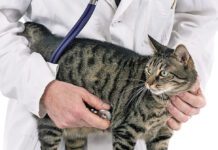If anyone ever told you that you had “cat breath,” you might have a real reason to be insulted. Thats because cat breath can be rather unpleasant, which is something you already know if youve ever smelled bad breath on your own cat. Normal breath should be neutral, warm and nonoffensive. But bad breath (halitosis) is obvious and unpleasant. You may be surprised to know that a cats bad breath is often a sign of any of a variety of problems from dental disease to serious illness. So if your cats breath knocks you over, dont just wince and bear it. Find out whats causing it. The Causes of Cat Breath Dental and oral cavity disease –
Cancer –
Cancer of the mouth can lead to a bad odor. Oral cancer is life-threatening, so if your cat has bad breath, its important to rule this out or start treating it immediately after diagnosis. Lung cancer (and respiratory or sinus infections) may also cause bad breath.Kidney or liver disease –
Either disease may cause your cat to develop ulcerations of the mouth membranes, leading to a foul mouth smell. Advanced kidney disease may produce an acidic breath odor.Diabetes –
As in humans, uncontrolled feline diabetes can result in high levels of sugar, “causing ketoacidosis a build-up of ketones,” says Dr. Brunt, “which is a sick bodys by-product of abnormal glucose metabolism.” Some people are able to smell the acetone-like sweet odor to the breath (similar to nail polish remover). “If you smell this on your cats breath, contact your veterinarian immediately,” says Dr. Brunt, who is past president of the American Association of Feline Practitioners. “Ketosis can be extremely serious if not reversed.”Oral inflammatory problems
– Immune diseases can lead to inflammation of the tissues in the mouth. One is lymphocytic plasmacytic gingivitis. “It is sometimes so severe that the cat is unable to open its mouth or chew properly, besides having bad breath,” says Dr. Brunt.Treating Cat Breath
The most important thing you can do is to report your cats bad breath to your veterinarian. Think of bad breath as a sign of something else going on not as a condition in and of itself. Watch for other signs that you may need to report to your veterinarian. These include: oral discharge, especially blood around the mouth or on the front paws; oral pain; drooling; difficulty swallowing; trouble eating; or avoiding food.
Your veterinarian will obtain a complete history and perform a thorough physical examination of your cat, including an in-depth oral exam that may include X-rays.
“Ideally, seeing your veterinarian twice yearly will help identify mouth disease early,” says Dr. Brunt, “so it can be identified or treated before major problems occur.” If dental disease is present and causing the halitosis, your veterinarian will treat the problems and then set you up with a home-care program to keep bad breath at bay. This may include daily brushing of your cats teeth, pet-specific oral rinses, water additives and plaque repellents to help dissolve and repel the attachment of plaque to the teeth. Your veterinarian may also recommend therapeutic (prescription) diets when oral disease is present. If another condition is causing the bad breath, your veterinarian will diagnose it and then set up a treatment plan.
You may see products advertised for curing cat breath. Before you try any, seek advice from your veterinarian. You need to consider your cats age, health, size and possibly breed before trying these products. Does the cat need to eat, drink or chew the product? The most important thing to consider is safety. “Remember that the label veterinarian-approved says nothing about how effective the product is, and safety may not have been assessed,” says Dr. Brunt.
Although its unpleasant, bad cat breath can actually turn out to be a good thing if it alerts you to a condition that needs attention. So instead of turning your head when your cat breathes on you, turn to your veterinarian to evaluate your cats halitosis. And bring back the sweet-smelling cat you love to be with.
v


